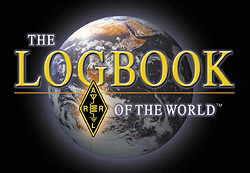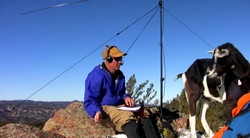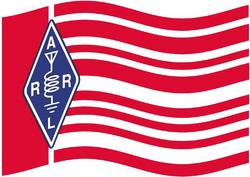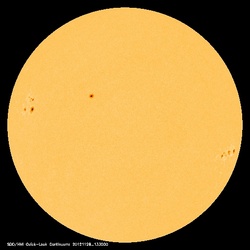 November 29, 2012 John E. Ross, KD8IDJ, Editor
| ||||||||
+ Available on ARRL Audio News. + Public Service: The 14th Annual SKYWARN Recognition Day Set for December 1
The 14th Annual SKYWARN Recognition Day (SRD) Special Event will take place Saturday, December 1, 2012. SRD is co-sponsored by the ARRL and the National Weather Service (NWS) as a way to recognize the commitment made by Amateur Radio operators in helping to keep their communities safe. According to SRD Coordinator David Floyd, N5DBZ, Amateur Radio operators can visit their local participating NWS office, working as a team to contact other hams across the world throughout the 24-hour event on 80, 40, 20, 15, 10, 6 and 2 meters, as well as 70 centimeters. Read more here. + Amateur Radio in Space: Mikhail Kornienko, RN3BF, and Scott Kelly to Spend One Year on International Space Station
Russian Cosmonaut Mikhail Kornienko, RN3BF, of the Russian Federal Space Agency and NASA Astronaut Scott Kelly have been selected for a one-year mission aboard the International Space Station in 2015. According to NASA, the mission will include collecting scientific data important to future human exploration of our solar system and to understand better how the human body reacts and adapts to the harsh environment of space as NASA plans for missions around the Moon, an asteroid and ultimately Mars. Read more here. + ARRL's Logbook of The World: Bug Fix Is in Place ARRL Chief Executive Officer David Sumner, K1ZZ, reports on a bug fix for Logbook of The World. The fix for the Logbook of The World (LoTW) bug was implemented at 2103 UTC on November 28. Full credit goes to ARRL Information Technology Manager Michael Keane, K1MK, for figuring out what was happening and how to correct it.
There are two ways of uploading logs: via the LoTW website and by e-mail. LoTW users should note that e-mailed logs were not affected by the bug, so no e-mailed logs will need to be resubmitted. At the time the fix was implemented, LoTW processing was running almost exactly three days behind. If a user's most recent upload was made before 2100 UTC on November 25 and it has not yet been processed the file should be resubmitted. There should be no need to resubmit logs uploaded since 2100 UTC on November 25, which would include all CQWW CW DX Contest logs submitted after the end of the contest. There is, however, a very slight chance that logs uploaded after this date might have been overwritten. If you find that your logs that were uploaded after November 25 are not appearing in your LoTW account, please wait until after December 3 to upload them again. Thanks to everyone who has been patient while we grappled with this bug. The issue of slow processing speed is also being addressed, but it requires a hardware upgrade that will take several weeks to implement. Your continued patience and understanding will be appreciated. + Ham Radio in Hollywood: Morse Code Plays Role in New Spielberg Movie
Producer Steven Spielberg has used Amateur Radio or Morse code in three of his last four movies: Super 8 (2011), The Adventures of Tin Tin (2011) and Lincoln (2012). Members of the Morse Telegraph Club -- an association of retired railroad and commercial telegraphers, historians, radio amateurs and others with an interest in the history and traditions of telegraphy and the telegraph industry -- played an integral part in the production of Lincoln. "Nine of the 16 telegraph stations depicted in the War Department were fully operational," explained Morse Telegraph Club International President James Wade, WB8SIW. "These instruments could be operated in any combination through the use of a specialized computer program and custom-built terminal units for the process. When necessary, a hand key could be inserted in the individual telegraph loops so messages could be improvised." Read more here. + On the Air: The ARRL 10 Meter Contest: The Band Is Hot!
Will it be possible to beat the 2011 running of the ARRL 10 Meter Contest? With more than 5300 logs received and worldwide openings last year, that may be a tall order. This past weekend during the CQ WW CW Contest, 10 meters was in great shape, despite a coronal mass ejection that hit on Friday evening. But according to ARRL Contest Branch Manager Sean Kutzko, KX9X, one thing's for certain: There's going to be a ton of activity, as hams from all around the world look to work some DX on the band! Read more here. + On the Air: ARRL UHF/Microwave Band Plan Committee Seeks Input 6 and 3 Centimeter Bands
Last year, in recognition of the need to update the published band plans for our UHF and microwave bands, the ARRL Board of Directors formed the UHF/Microwave Band Plan Committee to develop revised national plans for the amateur bands between 902 MHz and 3.5 GHz. After receiving extensive user input, the committee completed its task and the resulting band plans were approved by the Board in July 2012. The committee has now received an additional assignment to conduct a similar update to the 6 and 3 centimeter bands. In order to do this effectively, the committee needs to know how various segments of these bands are now being utilized around the country. You can help them by sharing what you know about local usage in your area and by asking other users -- both individuals and groups -- to do the same. Read more here. Solar Update
Tad Cook, K7RA, reports: The average daily sunspot number for the week was down nearly 38 percent to 78.9, compared to last week's average. The average daily solar flux dropped nearly 13 percent, to 121. The seven-day reporting period for these data ran from November 22-28. The predicted solar flux for the near term is 110 on November 29, 105 on November 30-December 1, 100 on December 2-4, 105 and 115 on December 5-6, 130 on December 7-11, 135 on December 12-15, 140 on December 16-17, 135 on December 18-19, 130 on December 20-22, 120 on December 23-24, 115 on December 25, 110 on December 26-28, and rising again to 115 on December 29-30. The predicted planetary A index is 11, 15 and 8 on November 29-December 1, 5 on December 2-5, 10 on December 6-8, then 5 and 8 on December 9-10, 5 on December 11-15, 8 on December 16, and back down to 5 on December 17-31. The new year is expected to begin with slightly unsettled conditions, with a predicted planetary A index at 10 on January 1-4. Look for more on the ARRL website on Friday, November 30. For more information concerning radio propagation, visit the ARRL Technical Information Service Propagation page. This Week in Radiosport This week:
Next week:
All dates, unless otherwise stated, are UTC. See the ARRL Contest Branch page, the ARRL Contest Update and the WA7BNM Contest Calendar for more information. Looking for a Special Event station? Be sure to check out the ARRL Special Event Stations web page. Upcoming ARRL Section, State and Division Conventions and Events
To find a convention or hamfest near you, click here. ARRL -- Your One-Stop Resource for Amateur Radio News and Information Join or Renew Today! ARRL membership includes QST, Amateur Radio's most popular and informative journal, delivered to your mailbox each month. Subscribe to NCJ - the National Contest Journal. Published bi-monthly, features articles by top contesters, letters, hints, statistics, scores, NA Sprint and QSO Parties. Subscribe to QEX -- A Forum for Communications Experimenters. Published bi-monthly, features technical articles, construction projects, columns and other items of interest to radio amateurs and communications professionals. Free of charge to ARRL members: Subscribe to the ARES E-Letter (monthly public service and emergency communications news), the ARRL Contest Update (bi-weekly contest newsletter), Division and Section news alerts -- and much more! Find us on Facebook. Follow us on Twitter. ARRL offers a wide array of products to enhance your enjoyment of Amateur Radio. Donate to the fund of your choice -- support programs not funded by member dues! Click here to advertise in this newsletter (subject to space availability). | ||||||||















